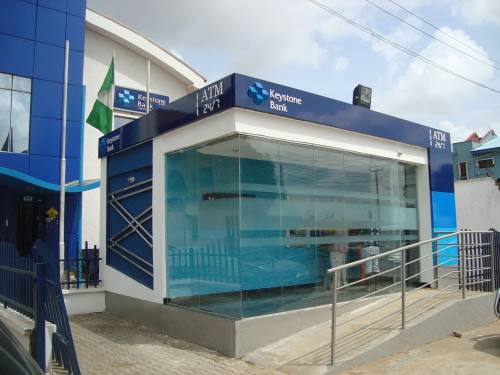Keystone Bank: Undisclosed Performance Signals Depth in Doldrums

Keystone Bank Limited is visible in the Nigerian banking space, but little information is available about its operating performance. Unlike its peers, the bank’s Annual Reports and Accounts are not available on its Website and not obtained at its branches. Therefore, assessing the impact of the various regulatory and operating policy environments on the lender is difficult, notwithstanding that it receives and transacts businesses with depositors’ funds.
The bank’s website indicates that the annual reports could be accessed on the platform: “Please find below links to view a history of Keystone accounts and reports over the years”, but attempts to access the documents yielded no results. The links did not open to any document at the time of filing this report. Several attempts proved unsuccessful, suggesting that the documents had either been deleted or did not exist. “Keystone Bank provides services for our esteemed clients with a focus on wealth building and investment security”, the bank added on the website.
Search showed clips of a few newspaper reports on the bank in 2018. The stories made reference to the bank’s first, second and third quarter performance in that year. However, the reports could not be traced to published financials or comparative figures in previous reports.
In a news report titled, ‘Keystone Bank returns to profitability with N3.7 billion’ and published by The Guardian newspaper on May 28, 2018, the newspaper noted that the feat was achieved after many years in the doldrums. It also stated that it happened after the acquisition by Sigma Golf-Riverbank consortium following the successful completion of AMCON’s divestment from the bank.
“The bank for the quarter ended March 31, 2018, recorded a profit before tax of N3.72 billion, compared with a loss of N2.79 billion over the same period in 2017.
“Deposit grew 42 per cent or N84 billion to N283 billion at the end of the quarter March 2018
“The bank had recently posted its first quarter financial results, which indicated significant profits in just eight months of taking over the helm of affairs after many years of struggling to stay afloat,” The Guardian reported.
The newspaper also quoted the then Managing Director/Chief Executive Officer, Mr Obeahon Ohiwerei, as saying, “This achievement is a testament to the hard work and resilience of the management and staff of the bank. From inception it has been our vision to restore the confidence of all our stakeholders with tangible results and we are indeed pleased with this start.” But there was no report to corroborate the narratives.
Similarly, in its report titled, ‘The many headaches of Keystone Bank – Underlying pressures persist’and published on December 28, 2018, Proshare, a renowned financial information services outfit, outlined the following excerpts from the bank’s 2018 quarterly reports:
Highlights:
•Profit After Tax (PAT) of N5.3bn, N79.2bn and loss of N1.3bn recorded in March, June and September 2018, respectively.
•From the N5.3bn PAT declared in March 2018, the previous two months’ losses were subsumed under the profit, while there was a quarterly bonus taken by directors.
•Capital Expenditure growth was above the bank’s net working capital, substantial increase was noticeable in fixed assets, mostly vehicles.
•Excessive growth in administrative and general expenses depressed the bank’s operating income and increased the erosion of equity by way of accumulated losses.
•Steady increase in the bank’s non-performing loans.
Background/Context:
Pried from the grips of a bank undertaker, the Asset Management Company of Nigeria (AMCON), Keystone Bank, a successor institution to defunct Bank PHB, is coming to terms with the cold realities of a difficult economic environment.
A cursory review of the bank’s recent Q3 2018 financial statement showed the following:
1. Operating expenses grew from N2.04 billion at the end of March 2018 to N2.4 billion at the end of June 2018, and then rose further by N400 million at the end of September 2018; representing a leap of 17.64 per cent. On a year to date basis, it grew consistently from N6.3 billion in Q1, 2018 to N13.7 billion in Q2 2018 and N22.4 billion in Q3 2018.
This may be attributed to the ill-advised expansion in its capital and administrative expenses which appears to be the result of the bank’s new owners and management taking early bonuses unjustified by immediate corporate performance.
2. Non-financial costs spiraled out of control rising by 17.4 per cent between March and June 2018 and then by 18.8 per cent between June and September 2018. This contrasts sharply with falling operating income which declined by 66 per cent between March and June 2018 while income dropped from N7.35 billion at the end of March 2018 to N2.50 billion at the end of June 2018; after which operating income declined by 38 per cent from N2.50bn in June 2018 to N1.55 billion in September 2018.
Proshare further stated, “A lot of the trouble comes from the bank’s high capital expenditure which has hurt its operating cash flow and thinned down what analysts have called its ‘free’ cash flow. The bank’s huge expenditure on motor vehicles in 2018 at a time when a multiplicity of electronic banking platforms has conveniently reduced the face time needed to service corporate and private customers is difficult to understand.
“The bank also gets into some difficulty where its current liabilities exceed its current assets to deliver negative working capital. Governance and risk management standards require that capital expenditures should be constrained by the extent of the positive size of a bank’s capital.”
The 2018 reports appears to be the last of the bank’s ‘disclosed’ performance report. Yet, these narratives could not be traced to published financials as is the practice.
Besides educating the public on its performance, published reports would help to show the impact of several regulatory policy initiatives of the Central Bank of Nigeria (CBN) to strengthen the financial services industry and to boost economic growth. The extent the CBN financial inclusion policies have impacted on the operations of Keystone Bank, especially its customer base, could also not be ascertained. The same goes for the several CBN intervention funds which are channeled through the deposit money banks.
The role of the bank in promoting SMEs through the implementation of the Bank of Industry (BoI) schemes cannot be found. Effects of the COVID-19-induced macroeconomic strain on the operating environment cannot be measured on Keystone Bank.
“The non-disclosure of their performance is very wrong, and the regulatory authorities are to blame. Agreed, Keystone is a private bank and not quoted on The Exchange, but people deposit their hard earned money in the bank. So, they (the bank) are under moral obligation to publish their annual reports and accounts on their website, just like other private financial service firms,” said Mr Boniface Okezie, Chairman, Progressive Shareholders Association of Nigeria.
In the view of Mr Mukhtar Mukhtar, Chairman, Trusted Shareholders Association, full disclosures are basic requirements for companies that are not owned by one man. He said that not publishing the firm’s performance or responding to enquiries may send wrong signals about the true health of an organisation.
“The regulators in Nigeria are not helping matters. Even an unquoted company is bound by the laws governing limited liability investments. Yes, Keystone Bank is not quoted, but rendering open their results is beneficial because they deal with public funds.
“People have accounts with them and they deserve to know the financial health of their banker in order to guarantee the safety of their savings.
“A website offers all valuable information about companies. Displaying important components of annual accounts cannot be overemphasised,” Mukhtar told THEWILL in a note.
A disengaged branch head of the bank also told THEWILL on the condition of anonymity that Keystone Bank is struggling to play in the financial services market. According to the source, the inability or failure to post its performance reports on its website suggests that the lender is deep in the doldrums, adding that its customer base has shrunk significantly in recent times. But this could not be confirmed.
The corporate communications departments of the Central Bank of Nigeria and the Securities and Exchange Commission (SEC) did not respond to enquiries sent to them for their comment on the matter. The Asset Management Corporation of Nigeria (AMCON) spokesman, Jude Nwauzor, confirmed to THEWILL that Keystone Bank is no longer under AMCON portfolio. But this newspaper could not ascertain the extent the bank meets its AMCON and NDIC levy obligations, which is published in banks’ annual reports.
The Ag. Divisional Head, Marketing & Corporate Communications of Keystone Bank Limited, Izore Bamawo, did not respond to text messages and phone calls made to her mobile telephone. There was no response as to alternative means the bank’s performance reports could be accessed.
However, in reply to an email sent to the bank’s ContactCentre, it said, “Thank you for contacting Keystone Bank. We acknowledge receipt of your mail below with regards to the Keystone Bank annual report. Kindly visit any of our branches closer to you for further assistance.” But two of the branches visited in Lagos – Akowonjo Road in Alimosho Local Government Area and Mobolaji Bank Anthony Way in Ikeja, referred this newspaper to the bank’s head office in Victoria Island. The link in the official website of the bank did not respond at the time of filing this report last Friday.
In its efforts to support Nigeria micro, small and medium enterprises with knowledge to manage and grow their businesses, Keystone Bank in June 2021 trained start-ups with the requisite knowledge about the African Continental Free Trade Area (AfCFTA) window and the opportunities it presents to their businesses.
The three-day MSME Masterclass Webinar series tagged, “Taking your SME business across borders” had over 600 participants and 200 registered MSMEs in attendance.
The lender’s MSME Online Academy was launched in 2020 as part of its corporate social responsibility (CSR) initiatives. It was tailored to equip MSMEs with the necessary tools and resources required to successfully manage, grow and make their businesses attractive to investors and for profitability.
Keystone Bank’s existence can be traced to 1981 when it was originally founded as Habib Bank Nigeria Limited. In 2001, Platinum Bank was established and a merger took place between Habib Nigeria and Platinum Bank to form BankPHB in 2005.
In August 2011, Keystone Bank Limited was issued a commercial banking licence by the CBN, on the same day the apex bank revoked the banking license of Bank PHB. Keystone Bank consequently assumed the assets and some liabilities of the defunct Bank PHB. In March 2017, AMCON announced that Keystone Bank had been sold for N25 billion ($81.5 million) to a new investor, Sigma Golf-Riverbank consortium.
The bank maintains a network of over 150 business offices and locations in all the states of Nigeria, with Lagos hosting majority of the branches.




